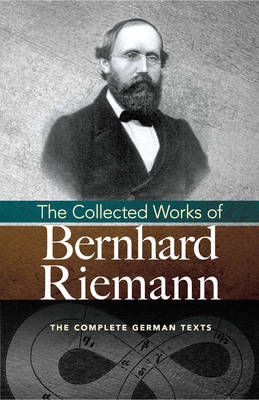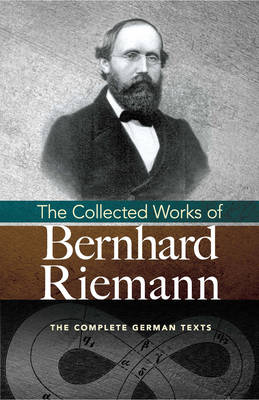
- Afhalen na 1 uur in een winkel met voorraad
- Gratis thuislevering in België vanaf € 30
- Ruim aanbod met 7 miljoen producten
- Afhalen na 1 uur in een winkel met voorraad
- Gratis thuislevering in België vanaf € 30
- Ruim aanbod met 7 miljoen producten
Zoeken
Omschrijving
This unabridged text of the complete works of Bernhard Riemann enables German-language readers to examine the great mathematician's revolutionary concepts exactly as he set them down. The collection presents both the 1892 edition of the works, edited by R. Dedekind and H. Weber, and the 1902 supplement, edited by M. Noether and W. Wirtinger. Contents include 31 monographs, three complete lecture courses, and 15 miscellaneous papers. The selections feature Riemann's epoch-making papers on Abelian functions, representation of a function by trigonometrical series, non-Euclidean geometry, the study of space, conformal mapping, number theory, topology, and other mathematical topics.
As Dirk Jan Struik noted in his Concise History of Mathematics, "With Bernhard Riemann, Dirichlet's successor at Goettingen, we reach the man who more than any other influenced the course of modern mathematics." Indeed, many of these papers had a profound impact on the work of Einstein, de Sitter, Minkowski, Heisenberg, Dirac, and other outstanding mathematicians and physicists. This edition features an English-language introduction by Professor Hans Lewy of Stanford University.
As Dirk Jan Struik noted in his Concise History of Mathematics, "With Bernhard Riemann, Dirichlet's successor at Goettingen, we reach the man who more than any other influenced the course of modern mathematics." Indeed, many of these papers had a profound impact on the work of Einstein, de Sitter, Minkowski, Heisenberg, Dirac, and other outstanding mathematicians and physicists. This edition features an English-language introduction by Professor Hans Lewy of Stanford University.
Specificaties
Betrokkenen
- Auteur(s):
- Uitgeverij:
Inhoud
- Aantal bladzijden:
- 704
- Taal:
- Engels
- Reeks:
Eigenschappen
- Productcode (EAN):
- 9780486812434
- Verschijningsdatum:
- 15/08/2017
- Uitvoering:
- Paperback
- Formaat:
- Trade paperback (VS)
- Afmetingen:
- 137 mm x 213 mm
- Gewicht:
- 816 g

Alleen bij Standaard Boekhandel
+ 106 punten op je klantenkaart van Standaard Boekhandel
Beoordelingen
We publiceren alleen reviews die voldoen aan de voorwaarden voor reviews. Bekijk onze voorwaarden voor reviews.











